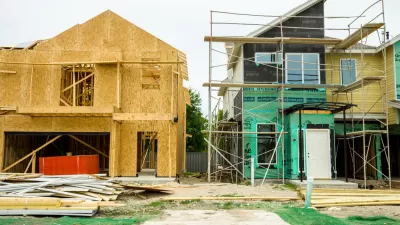While many policies that affect housing are decided on at the local level, there are several steps state officials can take to pave the way for healthier housing markets.

According to a study by Jenny Schuetz of The Brookings Institution, "the economic, social, and environmental costs of poorly functioning housing markets spill over beyond local boundaries to affect entire regions and states. State-level action has the potential to improve these outcomes," Schuetz writes.
The report outlines steps state governments can take to improve the conditions of housing markets and meet the needs of their state's populations. After analyzing their local conditions, states can encourage production in high-demand areas through production targets and other measures, provide direct support to low-income households, and use land use and building regulations to mitigate the effects of climate change. Schuetz stresses the importance of starting with "thoughtful data analysis" and, from there, using small-scale pilot programs to evaluate and adjust policies before putting them into full effect.
Schuetz cautions that "[b]ecause states currently start from such different baselines—both in market conditions and institutional capacity—there is not one consistent set of recommendations that will work for all states." However, some general rules can help all state officials begin to understand how to alter their state's policies to most effectively impact the housing market. The full study examines case studies from five states to show how they have used different tools to improve housing markets with their unique characteristics.
FULL STORY: States can improve housing well-being through thoughtfully designed policies

Alabama: Trump Terminates Settlements for Black Communities Harmed By Raw Sewage
Trump deemed the landmark civil rights agreement “illegal DEI and environmental justice policy.”

Study: Maui’s Plan to Convert Vacation Rentals to Long-Term Housing Could Cause Nearly $1 Billion Economic Loss
The plan would reduce visitor accommodation by 25% resulting in 1,900 jobs lost.

Planetizen Federal Action Tracker
A weekly monitor of how Trump’s orders and actions are impacting planners and planning in America.

Waymo Gets Permission to Map SF’s Market Street
If allowed to operate on the traffic-restricted street, Waymo’s autonomous taxis would have a leg up over ride-hailing competitors — and counter the city’s efforts to grow bike and pedestrian on the thoroughfare.

Parklet Symposium Highlights the Success of Shared Spaces
Parklets got a boost during the Covid-19 pandemic, when the concept was translated to outdoor dining programs that offered restaurants a lifeline during the shutdown.

Federal Homelessness Agency Places Entire Staff on Leave
The U.S. Interagency Council on Homelessness is the only federal agency dedicated to preventing and ending homelessness.
Urban Design for Planners 1: Software Tools
This six-course series explores essential urban design concepts using open source software and equips planners with the tools they need to participate fully in the urban design process.
Planning for Universal Design
Learn the tools for implementing Universal Design in planning regulations.
Caltrans
Smith Gee Studio
Institute for Housing and Urban Development Studies (IHS)
City of Grandview
Harvard GSD Executive Education
Toledo-Lucas County Plan Commissions
Salt Lake City
NYU Wagner Graduate School of Public Service





























